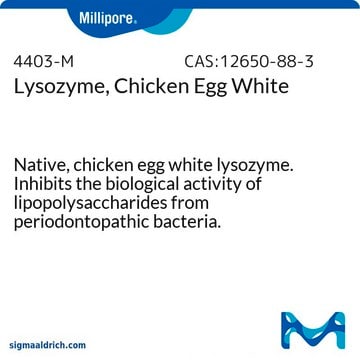62971
Lysozyme from chicken egg white
powder (crystalline), 70000-140000 U/mg
Synonym(s):
Mucopeptide N-acetylmuramoylhydrolase, Muramidase
Sign Into View Organizational & Contract Pricing
All Photos(1)
About This Item
CAS Number:
EC Number:
MDL number:
UNSPSC Code:
12352204
NACRES:
NA.22
Recommended Products
biological source
chicken egg white
Quality Level
form
powder (crystalline)
specific activity
70000-140000 U/mg
mol wt
single-chain 14.3 kDa
Mr ~14600
technique(s)
cell based assay: suitable
suitability
suitable for cell lysis
UniProt accession no.
application(s)
cell analysis
storage temp.
2-8°C
Gene Information
chicken ... LYZ(396218)
Looking for similar products? Visit Product Comparison Guide
Application
Enzyme breaks down the cell walls of bacteria; used to prepare spheroplasts.
Biochem/physiol Actions
Lysozyme hydrolyzes β(1→4) linkages between N-acetylmuramic acid and N-acetyl-D-glucosamine residues in peptidoglycan and between N-acetyl-D-glucosamine residues in chitodextrin. Gram-positive cells are quite susceptible to this hydrolysis as their cell walls have a high proportion of peptidoglycan. Gram-negative bacteria are less susceptible due to the presence of an outer membrane and a lower proportion of peptidoglycan. However, these cells may be hydrolyzed in the presence of EDTA that chelates metal ions in the outer bacterial membrane.
The enzyme is active over a broad pH range (6.0 to 9.0). At pH 6.2, maximal activity is observed over a wider range of ionic strengths (0.02 to 0.100 M) than at pH 9.2 (0.01 to 0.06 M).
The enzyme is active over a broad pH range (6.0 to 9.0). At pH 6.2, maximal activity is observed over a wider range of ionic strengths (0.02 to 0.100 M) than at pH 9.2 (0.01 to 0.06 M).
Unit Definition
1 U corresponds to the amount of enzyme which decreases the absorbance at 450 nm by 0.001 per minute at pH 7.0 and 25°C (Micrococcus luteus, ATCC 4698, as substrate)
Signal Word
Danger
Hazard Statements
Precautionary Statements
Hazard Classifications
Resp. Sens. 1
Storage Class Code
11 - Combustible Solids
WGK
WGK 3
Flash Point(F)
Not applicable
Flash Point(C)
Not applicable
Personal Protective Equipment
dust mask type N95 (US), Eyeshields, Gloves
Choose from one of the most recent versions:
Already Own This Product?
Find documentation for the products that you have recently purchased in the Document Library.
Customers Also Viewed
Theresa Pesch et al.
Frontiers in immunology, 10, 2630-2630 (2019-12-05)
Immune cell therapies based on the integration of synthetic antigen receptors comprise a powerful strategy for the treatment of diverse diseases, most notably T cells engineered to express chimeric antigen receptors (CAR) for targeted cancer therapy. In addition to T
Guangping Huang et al.
Science China. Life sciences, 64(1), 88-95 (2020-07-04)
Gut microbiota plays a critical role in host physiology and health. The coevolution between the host and its gut microbes facilitates animal adaptation to its specific ecological niche. Multiple factors such as host diet and phylogeny modulate the structure and
Rizwan Mahmud et al.
Journal of molecular microbiology and biotechnology, 29(1-6), 43-56 (2019-12-19)
The human gut is inhabited by several hundred different bacterial species. These bacteria are closely associated with our health and well-being. The composition of these diverse commensals is influenced by our dietary intakes. Non-caloric artificial sweeteners (NAS) have gained global
Steffi Rudolph et al.
Food chemistry, 224, 19-25 (2017-02-06)
Enzymatic hydrolysis of proteins from rice, soy, pea and wheat, with both chymotrypsin and thermolysin, resulted in hydrolysates, which are efficient inhibitors of the angiotensin-converting enzyme (ACE). IC
Franziska Trusch et al.
Nature communications, 9(1), 2347-2347 (2018-06-16)
The animal-pathogenic oomycete Saprolegnia parasitica causes serious losses in aquaculture by infecting and killing freshwater fish. Like plant-pathogenic oomycetes, S. parasitica employs similar infection structures and secretes effector proteins that translocate into host cells to manipulate the host. Here, we
Our team of scientists has experience in all areas of research including Life Science, Material Science, Chemical Synthesis, Chromatography, Analytical and many others.
Contact Technical Service







